February 4, 2010
Rehab medicine doc Krabak heads to Vancouver games
Dr. Brian Krabak said working as a physician at the upcoming Winter Olympics is akin to the catchphrase “the thrill of victory and the agony of defeat.” He chuckled in a recent interview when using this description, a reference to ABC News sports footage from the 1970s showing a ski jumper’s scary crash. Many of the reporters clamoring to interview Krabak before he heads up to Whistler are too young to remember the film clip, but they can always pull it up on YouTube.
What does he mean by this, exactly? Krabak, UW clinical associate professor of rehabilitation medicine, who has a secondary appointment in orthopaedics and sports medicine, said it’s exciting to practice sports medicine at the highest level on an international stage. “Being able to evaluate athletes and then figure out how to rehab them and get them back out there as soon as possible” is part of the excitement, he said.
And the defeat? From past experience at the Olympic Games in both Salt Lake City (2002) and Athens (2004), Krabak said there may be times when he’ll have to break bad news. It’s hard to tell an Olympic hopeful, “You can’t compete and you’re done,” because of an injury.
Krabak got his start working with elite athletes during his residency at Tufts-New England Medical Center in the 1990s. He began small by volunteering at high school and collegiate events up and down the East Coast, he said. Krabak connected with people who recognized his skills and interests, and he was tapped to work as a physician at the 1996 Paralympics Summer Games in Atlanta. He went on to do a sports medicine fellowship at the Mayo Clinic and received an invitation to the 2002 Games in Utah, where he worked as a physician in the athlete village.
An admitted “Type A,” ambitious personality, Krabak said he’s been fortunate to have a wonderful sports life, and it’s not over yet. At the Whistler Athlete Sports Medicine Clinic, Krabak said he’ll “triage, evaluate and discuss ‘return to play’ options for athletes.” The clinic is a fully-equipped primary care center, with capability of conducting MRIs (magnetic resonance imaging), CT scans (computerized tomography) and X-rays.
“Most of the trauma we’ll see will be related to the alpine events, ski-jumping, bobsled and luge,” said Krabak. Events such as snowboarding will take place in Vancouver. The majority of injuries he said he expects to see will be due to over-use and will include knee injuries, like ligament tears the make the joint wobbly.
Krabak will be tweeting from the 2010 Winter Games. You can follow him @OlympicDrKrabak
Along with treating the athletes, Krabak said he enjoys interacting with medical professionals from other countries. What he learns may translate into better care for his patients, he said. “I’d like people to know how fortunate I am to have these experiences,” he said. “It’s exciting and I will walk away being able to better educate patients, colleagues and students.”
In addition to his work at several clinics on the UW campus, Krabak also practices at Seattle Children’s.



